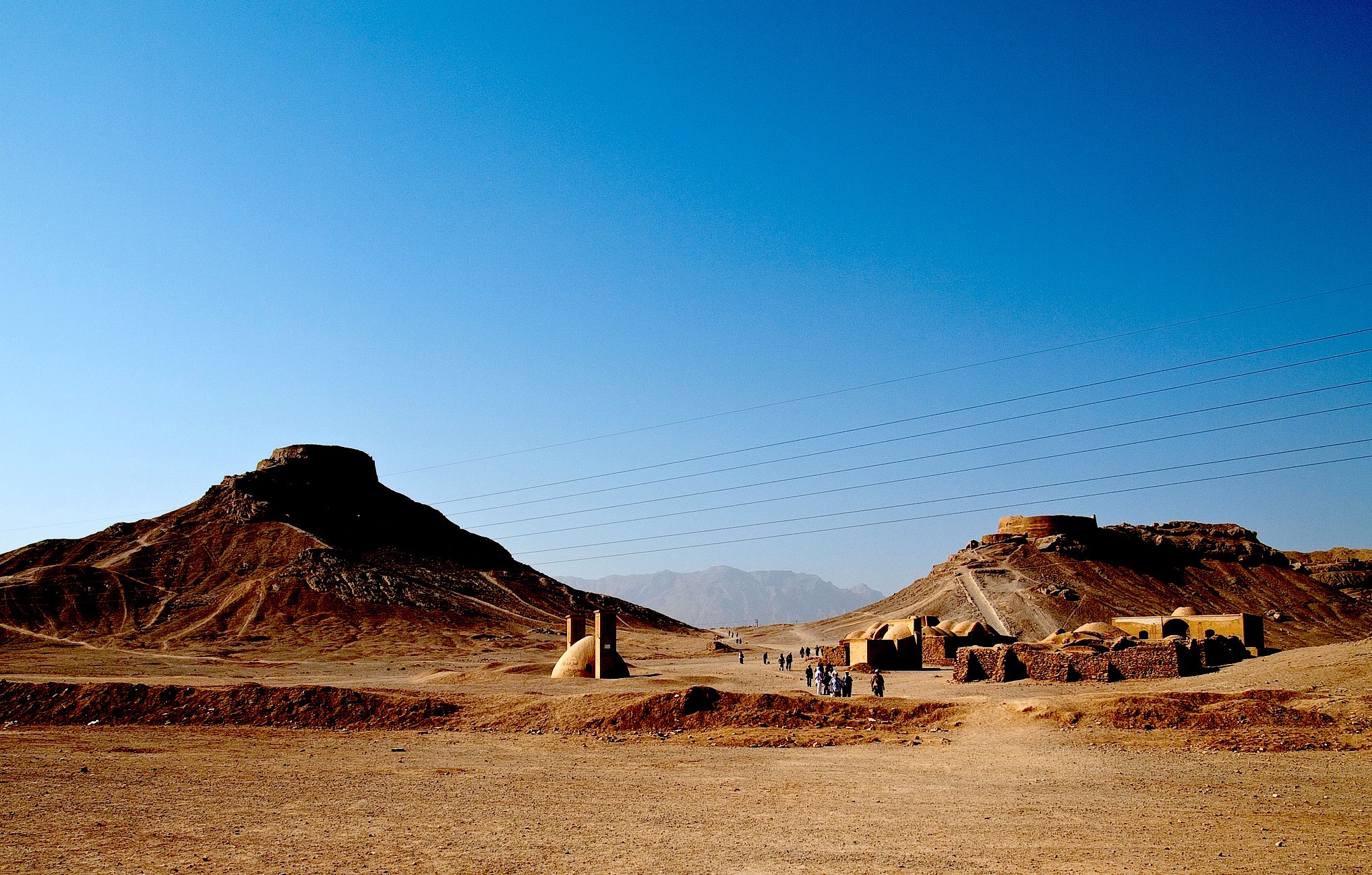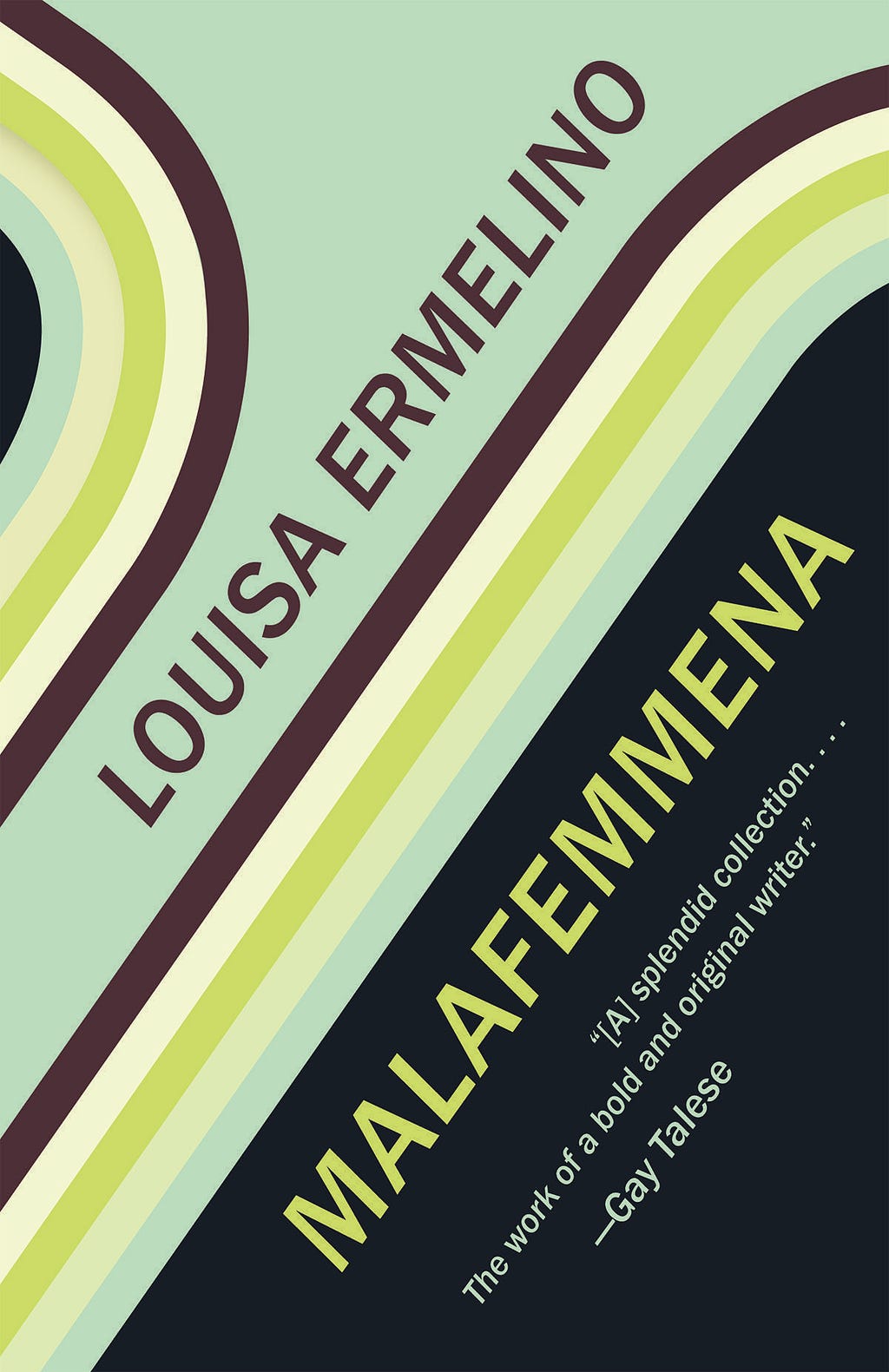Lit Mags
James Dean and Me by Louisa Ermelino
A story of imagining celebrity

AN INTRODUCTION BY LILY TUCK
In 1969, Louisa Ermelino traveled overland to India but, according to her own admission, “the place that stood out from everywhere else was Afghanistan. And it started at the border, my first encounter with ‘no man’s land,’ this one a swath of desert between Iran and Afghanistan. It was like entering a portal… nothing was logical and we were completely at the mercy of the Afghans who managed the immigration process. They exploited us cheerfully at every turn and ran what was almost a camp… some travelers had been there for days.”

Ermelino’s three previous novels, The Black Madonna, The Sisters Mallone, and Joey Dee Gets Wise, all draw on the Italian American community in Greenwich Village where she grew up and from which she escaped to go to college — only the second neighborhood girl, she claims, who went away to school. Malafemmena, her collection of stories out this month, is a departure. The stories follow women who live precariously on the edge, and who travel in unchartered and unsafe territory, and do drugs and have sex with strangers. The stories are tough, lyrical, edgy, bold, and astonishing.
The border crossing between Iran and Afghanistan which, for Ermelino, was like “entering a portal” where nothing was logical is the key to the story “James Dean and Me.” Here the world becomes unreal; time stops or has little meaning, the events that unfold resemble a dream — a fever dream. The narrator is traveling with James Dean with whom she is in love; at the same time that she knows that James Dean is long since dead, and that his death has been exploited and that people even pay money to see the smoking wreck of his car and that, more to the point, the man she is with is named Kevin Muldooney. (Maybe he is a James Dean look-alike and maybe he is not. In either case, it does not seem to bother Kevin Muldooney to be taken for James Dean.)
Here the world becomes unreal; time stops or has little meaning, the events that unfold resemble a dream — a fever dream.
Never mind all that. The narrator insists on the fiction that James Dean is alive and that he is her lover. Clearly, there at the border in no man’s land, there is a different set of rules to live and abide by. Another reality can exist and the story is so grounded, so self-assured, that the reader, too, believes it. “James Dean and Me” speaks marvelously to the power of the imagination and to the role story telling has in shaping and giving meaning to our lives. Ermelino’s vivid pages do exactly that: in them, James Dean is alive and well.
Lily Tuck
Author of News from Paraguay
James Dean and Me by Louisa Ermelino
Louisa Ermelino
Share article
We got to the border late. Too late to cross, they told us. Well, not exactly. But the Afghans would not let us in because it was their dinnertime, and then they would have their coffee and a smoke, and probably even if we bribed them they wouldn’t check us through. We would have to spend the rest of the night in the patch of no-man’s-land in the desert, and if they got angry at us for some reason — because we had disturbed their dinner or disturbed their coffee or their smoke — they might not let us in at all. We would have to go back and that might not be possible because the Iranians were very sensitive about accepting people back that the Afghans had rejected. We could understand, certainly.
I looked at James. He looked at me. We decided to stay. The border guard smiled. He should not have, not with those black broken teeth that showed when he did, but who can control mirth? He told us that, conveniently enough, there was a hotel and restaurant just a furlong away with everything we could possibly need. James, of course, needed nothing, having been dead for some time. I liked him that way. He was just as handsome as when he was alive, which was amazing when you considered that terrible car crash. James didn’t even resent that people paid money to see the wreck.
He had heard that they had rigged it up so that it smoked all the time, as though the crash had just happened, and this made people very excited. They felt like they were right there. There were plans to preserve his body and maybe have it thrown across the seat in such a way that you could see his face, which was perfectly fine, not a scratch. The studio discussed messing it up a bit — some blood here, a cut there. One of the studio executives even suggested that they might remove an eye. That would really fascinate the crowd, he said (Jimmy did have such beautiful blue eyes). But in the end they thought it was too much trouble and went with just the smashed-up car.
Well, was I glad. First off, I never would have met James, and second, if I had, he would have been a mess, and as much as I’m in love with his personality, it’s his physical being that gets me, especially those beautiful blue eyes. He never explained to me how he got to Teheran. We found each other across the street from the Amir Kabir in a coffee shop where they served that thick sweet coffee and tea in little glass cups. I had been sitting in there alone when he came in. I knew who he was right off. He sat down next to me. He said he didn’t know why.
The first thing I said to him was, “You’re James Dean, aren’t you?”
He had looked at me like I was crazy. “Are you crazy?” he’d said. “Do you know how long James Dean has been dead?”
“Maybe,” I’d said. “Maybe not.”
“But he died in that terrible car crash. The Porsche, remember?”
“I remember.”
“Anyway, what would James Dean be doing here in Teheran?”
I’d shrugged. “What do I know? You should know. You’re James Dean.”
It had been his turn to shrug. We shared a pot of tea and left together. He had this great hotel room and we stayed there until our visas were ready to run out and we had to move on.
So there we were at the border. The name on James’s passport was Kevin Muldooney. Of course, he couldn’t travel under his own name. I understood that. The first time I saw his passport, he started to say something about the name, but I’d put a finger to his lips. I didn’t want to know anything. After all, some things you just don’t question. His name didn’t matter. I knew who he was.
The border hotel was cooler than I expected. James had different expectations. It was complicated. We were more than a generation apart even though we were both twenty-four. (There is definitely an advantage to dying young, never ever having to grow old.) And don’t forget, he was a movie star.
There were a lot of other travelers at the hotel. French, Dutch, German, even a couple of guys from South America . . . Argentina, I think it was. One of them was old but really well built and handsome and tan. He was half-naked even though the desert was so cold at night. He was wearing leather pants and had on some kind of feather-and-bead necklace with a matching headband. He was telling a story of getting beat up in Turkey and his friend Paco had a black eye and cuts on his nose, as if to back up the story. I heard something about Pamplona and Hemingway and I went “Wow” like the rest of the travelers who could understand English, but whispered to James that I wanted to get out of there.
The next morning, we went to the coffee shop and tried to find out about the bus to the border, but no one could tell us anything. Everyone was sitting around drinking tea and coffee and smoking huge standing water pipes.
“Now what?” I said to James.
“Hey, what do we care?” he said. “Cool out. When a bus shows up, we’ll leave.”
“But we’re on the edge of no-man’s-land. We could be here forever.”
James shrugged, leaned over, and gave me a kiss. I could see one of the Iranians watching us. Sometimes they cut holes in the walls or peered through the keyhole or just put their ear up against the door of the room where we slept. They thought we were all insatiable sexual animals and they wanted us desperately but were afraid to ask.
So the morning passed, and everyone started ordering lunch. I’d cooled out like James said. He was holding my hand under the table when this European man came into the café. He stuck out like a sore thumb. He was tall and very blond, very white. I thought he was in his sixties, but it was hard to tell. We were all so young that everyone who wasn’t as young as we were looked very old. I remember how dignified he was. His hair was short and smooth and parted to one side, and he wore a suit, an expensive European suit, with a tie and gold cuff links. He came right over to our table and sat down.
“Please,” he said, “I need your help.”
He looked from me to James and back again. He leaned over the table. I was worried that a sleeve of that beautiful suit would go into one of the empty cups of coffee and be stained forever by the sticky syrup at the bottom of the cup, but it didn’t. He leaned even closer, put his face next to ours, and folded his hands on the table.
“Will you help me?” he said.
“Who are you?”
“Shhh.” He had an accent . . . Scandinavian, I thought, and I was right.
“I’m with the Swedish Embassy in Kabul.”
“Great, maybe you can get us out of here and across the border. We got here last night and . . .”
James put a toothpick in his mouth and sat back, real slumped, like he always did for his publicity photos. God, was I in love. I forgot all about the Swedish diplomat and just concentrated on James.
“I’m trying to save a girl, an American girl.”
James was quiet and so was I, but James was watching the Swede. I was watching James, his beautiful blue eyes, his beautiful face, his beautiful hair. I was wondering how he got his hair to stay like that all the way out here in the desert. His hair looked exactly like it did in all his photos.
“I have to convince the authorities to let this girl go, or she’ll spend the rest of her life in the insane asylum. Have you any idea what an insane asylum is like in Afghanistan?”
James held my hand against the muscle in his thigh.
“Imagine a dark pit dug into the ground,” the Swede said.
“That’s it?”
“That’s it . . . and a bucket to do your business and the food, they throw it down at you — maggoty pieces of bread and lamb fat that dogs have chewed on.” The Swede closed his eyes. “That poor girl.” He opened his eyes. “She’s from Connecticut.”
“Oh, my God,” I said. “What can we do?”
“You can save her.”
“How?”
“I can’t go into details here. It’s not safe. You have to trust me.” His blue eyes bored into James’s blue eyes. “Will you help me? Will you come?”
“Of course I will,” I said, jumping up, upsetting a teapot. The Swede caught it before it could shatter, but not before the tea spilled out over the table. I remember watching the puddle of tea form on the table when I heard the Swede say, “Not you . . . him.”
“Why just him?” I said. The lamb kebab I’d had for lunch went sour in my stomach.
“Because he’s James Dean,” the Swede whispered. “They’ll listen to him.”
“I don’t know,” I said. “I don’t like it. We’ve been together since . . .”
The Swede ignored me. He put his hand, a very big hand with pink nails, on James’s shoulder. “Will you come? Will you save the American girl?”
James stood up, took his comb out of his hip pocket, and ran it through his hair. “Let’s go,” he said.
“James . . .”
“I’ll be back in no time, sweetheart. Be cool.”
I waved goodbye, but he didn’t see me. The Swede had an arm around his shoulders; it was almost an embrace. “I’ll wait right here,” I said. “I’ll be right here waiting.”
When I walked to the door of the café and looked out into the desert, I saw a black Volvo in the distance. I sat in the coffee shop until it was dark and they made me leave. I went back to the hotel. It was empty now because everyone else had somehow found the bus to the border. More travelers arrived the next night, caught in the wheel of no-man’s-land — Afghanistan closed, nice hotel, nice restaurant, you spend the night — and I sat with them in the café until they, too, caught the bus to the border.
The manager at the hotel tried to convince me to share my room because there were so many travelers coming through, all trying to beat the summer season when typhoid and cholera would close the border, but I said I was waiting for James, and he’d be back in no time, and then he wouldn’t have a place to stay.
A month passed before I left the border hotel. The Iranians were starting to look at me funny. Even the boy who cleaned my room and watched me through the keyhole said it was time for me to go. There was talk that I was working for SAVAK. I didn’t want to disappear in no-man’s-land.
Before I left, I went into the café and asked everyone about the Swedish diplomat and the American girl from Connecticut being held prisoner in an Afghan insane asylum. News traveled fast on the road. There were people in the café coming from both directions across the border, and I’d hoped someone might tell me something.
“He left in a black Volvo. He took James Dean with him,” I said.
“Who?”
“James Dean. Jimmy. Jimmy Dean. You know. Rebel Without a Cause. Natalie Wood. Giant. The Porsche. ‘Die young and leave a beautiful corpse.’”
“Far out . . . James Dean . . .,” someone said. The smoke from the water pipes was so thick I could hardly see who was talking.
“You’re crazy, man,” I heard a voice say. “James Dean? He’s dead.”
“He’s not,” I told him. “He’s just missing.”
“I remember a girl, in Erzurum, in Turkey. She got off the bus and walked into the mountains, and no one ever saw her again.”
“Cool,” from the crowd.
“I heard about her. She was a French teacher from New Jersey.”
“Wow!” from the crowd.
I took the bus to the border and asked about James and the Swede and the American girl as I passed through Herat and Kandahar and Kabul, and over the Khyber Pass into Peshawar and Rawalpindi. I even went to the Swedish Embassy when I got to New Delhi. I spoke to a tall blond man who said Sweden had no embassy in Afghanistan, and he was sorry about my boyfriend, but, after all, did we think we could go traipsing around the world with no money and no purpose and expect our embassies to bail us out when we got into trouble?
“No,” I said. “Of course not, but you have to understand. This is not just my boyfriend. This is James Dean.”
He got me a chair and a glass of water. “I think you should know,” he said very gently. “James Dean is dead.”
I sipped the water. My mouth was dry. “I know,” I told him. “I hate to believe it, but you’re probably right.”








